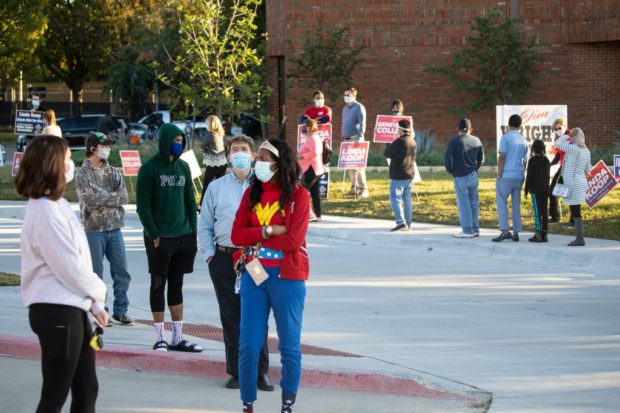Filipino Americans take safeguards to protect their votes in US polls

People wait in line to vote at Fretz Park Branch Dallas Public Library on the last day of early voting on October 29, 2020 in Dallas, Texas. Montinique Monroe/Getty Images/AFP
Gina Soliman (not her real name) has already filled up her mail-in ballot, voting for Joe Biden for president in the 2020 United States elections.
Two weeks ago, she and her husband, both Filipinos who migrated to the United States in 2000, went to their county in North Carolina to personally deliver their ballots even though they could always mail them back to authorities.
Having asked for ballots to be mailed to them to protect them from the new coronavirus, the couple nevertheless took a few minutes’ trip from their home to their designated county drop-off point to hand in their ballots.
“We want to protect our votes,’’ she told the Inquirer, when asked why she went to all that trouble. The Soliman couple lives in North Carolina, one of 12 US states said to be the battleground for the 2020 US presidential elections.
Soliman said the desire to protect their votes came after hearing US President Donald Trump during the Oct. 2 presidential debate between him and Biden, his Democratic Party rival.
Trump had questioned the integrity of mail-in ballots.
Trump cited in particular the case where some mail-in ballots were dumped in rivers in Wisconsin.
No missing ballots
But the US media has since reported that Wisconsin officials have denied there were missing absentee ballots.
However, the US Postal Service is conducting an investigation after authorities reported that some ballots were temporarily lost in a batch of mail found in a ditch in Wisconsin.
While the Soliman couple are concerned over the protection of their votes, David Levine, Elections Integrity Fellow at the US Alliance for Securing Democracy, said mail-in voting was a “secure process.’’
“We’ve had mail-in voting right in the United States since the Civil War. We’ve seen state and local election officials across the political spectrum that have some form of mail-in voting that exists,’’ said Levine, who belongs to a group supporting election security in the United States.
Mail-in voting fraud ‘rare’
Briefing participants of the US Foreign Press Center Virtual Reporting Tour on the 2020 US elections, which included the Inquirer, Levine stressed that fraud in US elections, including mail-in voting, was “rare.’’
“I think there’s been a number of studies that have been done right in this both in government, as well as in the research community that indicate that fraud is rare,’’ he said.
Levine mentioned an op-ed in The Hill where Amber Reynolds, a former Colorado election official and now the chief executive officer of the National Vote at Home Institute, and Charles Stewart, director of the MIT Election Data and Science Lab, wrote that more than 250 million ballots had been cast by mail nationwide over the past 20 years but just 143 criminal convictions related to them.
Safeguards in place
“That averages out to about one case per state every six or seven years, or a fraud rate of 0.00006 percent,’’ he said.
Levine assured that state and local officials had a number of checks and balances in place to ensure there would be no election fraud.
“(V)oters should feel confident that safeguards are in place to protect their votes from cyberattacks and technical problems that could arise for the November 2020 presidential election,’’ Levine added.
He cited the “substantial progress made to implement the kind of backup and security features that should allow all voters to cast ballots that will be counted even in the event of a successful cyberattack or other unforeseen systems failure.’’
These included the US government making sure that “there will be a paper record of nearly every vote for 2020,’’ he said.
In the question and answer portion, Levine cited safeguards that election officials had set up to protect against fraud and manipulation in mail-in voting.
These included, among others, signature verification of voters through the use of signature matching software in some states; the use of mail ballot technology; and more options to submit mail ballots that included states
installing “accessible, secure drop boxes and drop-off locations that make it easier for voters to drop off their ballots personally as opposed to relying on a third party, such as the (US) Postal Service, to assist with this task.’’
The last option was the one taken by the Soliman couple, who went to the drop-off station to hand in their ballots personally.
Levine said they expected a record number of mail-in voting this election as well as a large number of people voting in person.
As of Oct. 30, more than 85 million Americans have voted early—either by mail or in person, according to the British Broadcasting News which quoted the US Elections Project. It said the number of Americans who have voted early so far comprised 62 percent of the total number of Americans who voted in the 2016 elections.